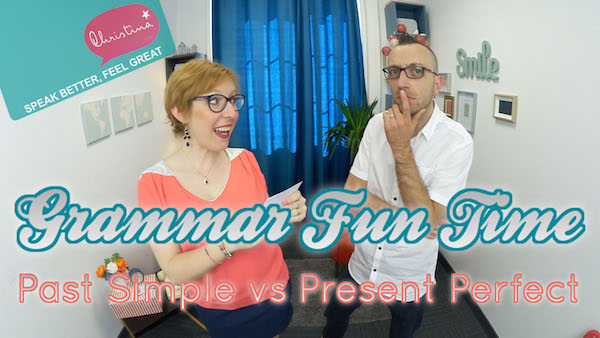
Today, you’re going to learn about 3 common mistakes in English that you may make.
But before you read more of this article, I have to warn you: This episode contains some sexual language that is not adapted for young audiences.
So before you use this video with your class, or watch it with little Pauline or Maxence, be sure to watch it alone to be sure you want them to see it!
Today, it’s an honest, no shame video. Because we’re adults here.
That means we’re going to talk about some common mistakes in English that can be very embarrassing…
“I LIKE TO PLAY GAMES WITH MY HUSBAND”
Did you see this advertisement by Eram? Looks like nobody told them that “Play with yourself” is slang for “se masturber”.
Why don’t big brands consult native speakers when they use English in their ad campaigns? Maybe I should send them my business card!
Another example? I have a French friend who loves playing tabletop games with her husband. When she talked to her English-speaking friends, she often made this common mistake in English. She would say:
“With my husband, we like to play together.”
It could be innocent, but it could be interpreted as “With my wife (or husband), we like to…mmm…you know”
If you’re talking to American friends, they’ll be shocked!
Well, they’ll probably imagine that you made a mistake with your English. And they’ll probably understand that you mean you like to play games or sports. That means they might not correct you, because for us Americans, it’s not polite to correct someone’s English.
This is why it’s a good idea to be precise about what you play with your spouse:
- we like to play tabletop games
- we like to play video games
- we like to play sports
But if you just say “We like to play,” it’s ambiguous and sounds like you’re telling your friends about your sex life! Not really appropriate for a conversation around the coffee machine.
Another tip?
If you’re playing a game alone, like Candy Crush or Solitaire, don’t say “I’m playing with myself.”
Ludivine, a lovely Speak English Ambassador once told me she was having fun, and trying to impress her friends by hitting tennis balls against a wall. So she was playing tennis by herself.
She yelled “Hey guys, look, I’m playing with myself!” You can be sure her friends looked!!
Remember, the correct expression is “I’m playing BY myself.”
“SCOOPS OF CHOCOLATE ICE CREAM”
Imagine that you’re at an ice cream shop in the United States. The server asks “Hi, can I help you?”
You know what you want, and you’re confident that you have the right words in English. You say “I’d like two chocolate balls, please.”
The server makes a face. He’s confused. He says “Um, sorry?”
Oops.
I speak French as a 2nd language. So I know that in French, you say “une boule de glace.” If you translate that literally, it is “a ball of ice cream.”
Don’t translate literally from your native language. Please.
In English, it’s NOT “two balls of chocolate.” The correct expression is “2 scoops of chocolate.”
“Balls” is slang for testicles. If you didn’t know that, know you do!
If you ask for “2 chocolate balls,” well, it’s like you’re talking about the testicles of a black man.
That is totally not politically correct, but slang rarely is politically correct.
So, please no offense, I’m just explaining what it means so that you don’t make this embarrassing, common mistake in English!
“GIVE ME A HUG!”
In French, you might tell your friends and family “Fais-moi un bisous.” In many other cultures, like Italian or Spanish, it is also common to “kiss” your friends and family when you see them.
And even if you don’t kiss, you put your cheek next to your friend’s cheek.
This action does NOT translate to “Give me a kiss!” in English. In the US, we don’t do this cheek-kiss action.
In French, it’s called “un bisous” or “faire la bise.” And it scares the crap out of Americans who don’t expect it!
Be sure to watch the lesson to see how my sister reacted when Romain tried to “faire la bise” the 1st time he met her. She totally panicked!
In the US, “Give me a kiss” is usually reserved for your romantic partner, or for close family.
In the US, we hug like the the French “font la bise.”
So you can say to your friends “Give me a hug” to invite them to physically express their friendship.
Another interesting fact: We tap each other on the back when we hug. You’ll see a demonstration in the lesson.
This tap on the back indicates that the hug is friendly, not romantic. It’s a very subtle difference in American body language that no one probably explained to you.
Now you know!
WHAT IF YOU MAKE THESE COMMON MISTAKES IN ENGLISH?
I don’t want you to make these embarrassing mistakes in English with your friends or colleagues, but if you do, they’ll probably laugh with you.
And you should laugh at yourself too, because part of learning a language is making mistakes, laughing and learning.
Now, watch the lesson to learn all about how to avoid these common mistakes in English, and what to say instead!
What about you?
Have you ever made any of these mistakes?
Do you have a funny story to share with us?
If you want to improve your English, you need to practice!
Share your story in the comments below.
Talk to you later,
Christina
P.S. Good news! My book “What the Faute?: Un livre in English pour éviter 32 erreurs fréquentes en anglais” will be available later this week!
Click here to get my ebook “What the Faute” to avoid 32 common mistakes in English

<script async data-uid=”91ec263eec” src=”https://f.convertkit.com/91ec263eec/c9f3802904.js”></script>
More English lessons...
Click the image to see the lesson









ooops… That reminds me of the time when I said “can I come on your knees?” to my new boyfriend.
We had been dating for only 4 days…
We were in a pub, there was no chair left and I just wanted to sit down !
Not… Not… ahem…. of course not !!
Needless to say how embarrassed I was when he explained the double meaning…
Thank you for this new lesson Christina & happy new year !
Oh my god, you just made me laugh out loud in the open space where I work!! That is so funny and I can totally imagine someone saying that! Thanks so much for sharing your story. It put a smile on my face!!
And happy new year to you too, Nicole!
Hello !
So what does mean “come on your knees” if it’isnt really what we think ?
Thanks again for your marvelous english lessons, Christina.
Bye.
It means: “jouir sur tes genoux” which is not at all what you thought, I am sure 🙂 The verb needed a complement to clarify the meaning! like “come sit on your knees” or simply “sit on your lap” which sounds like was the real request!
A very funny story indeed!
Very good explanation, Otir! I think you’ve done my job, so I’m just going to have a cup of tea now 🙂 Thanks!
Really interesting topic, that is never tackled and nevertheless fundamentally important in intercultural relationships.
“Bises” in France is so natural and it becomes more and more current even for people who do not really know each others… As I left France nearly 2 decades ago this was not a common manner between colleagues, we used to shake hands. Now when I am in France for work I can’t help being surprised to get “bises” from colleagues every time I come to the office. I am French, I know this is normal but I cannot get used to it… for me this remains something for friends and family.
When speaking about differences between the American way of giving hugs and the French way of giving “bises”, I remember meeting an American friend I knew from Austria after years. I was not aware of the habit of giving hugs in the USA and when he gave me a hug I tried to loose the hug somehow and went so red that he might have imagined thoughts I did not have. I though wow… he really missed me but what does he wants from me now? I felt really unconformable, not understanding that this was only a friendly hug meaning that he was pleased to see me again after all those years… In France or in Austria you never hug people like this, only in a romantic relationship or maybe to comfort a good friend who is very sad or to congratulate a very close relationship in an emotional and exceptional situation.
Hi Christine!
Thanks so much for the compliment! Yes, I find intercultural issues very interesting, especially in cultures that seem very similar on the surface, like most Western cultures. When you dig deep, you see there are HUGE differences!
Your story about misinterpreting the meaning of the hug is really funny, because it reminds me of what I thought about “la bise” when I first came to France! I thought “Wow, all these guys must really like me because they’re giving me kisses!” And then I learned that it was that way for everybody, not just me :-p
That’s interesting about the evolution from shaking hands to la bise in France as well! Maybe it goes with the more general tendency to use “tu” in the office, even with managers? So cultural differences could also be generational and not just national!